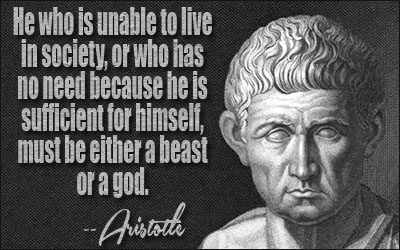ARISTOTLE QUOTES III
Greek philosopher (384 B.C. - 322 B.C.)

Notice: Undefined variable: id in /hermes/walnacweb03/walnacweb03ak/b2149/pow.notablequote/htdocs/a/includes/quoter.php on line 25
Where perception is, there also are pain and pleasure, and where these are, there, of necessity, is desire.
ARISTOTLE
Notice: Undefined variable: id in /hermes/walnacweb03/walnacweb03ak/b2149/pow.notablequote/htdocs/a/includes/quoter.php on line 35
Physica
Notice: Undefined variable: id in /hermes/walnacweb03/walnacweb03ak/b2149/pow.notablequote/htdocs/a/includes/quoter.php on line 61
Both excess and defect are alike prejudicial to moral virtue.
ARISTOTLE
Nicomachean Ethics
Legislative enactments proceed from men carrying their views a long time back; while judicial decisions are made off hand.
ARISTOTLE
Rhetoric
All men by nature desire to know.
ARISTOTLE
Metaphysics
Nature, we see, has variously moulded the human frame: some men are strongly built, and firmly compacted; others erect and graceful, unfit for toil and drudgery, but capable of sustaining honourably the offices of war and peace. This, however, holds not universally; for a servile mind is often lodged in a graceful person; and we have often found bodies formed for servitude, animated by the souls of freemen.
ARISTOTLE
Politics
Rhetoric is useful because truth and justice are in their nature stronger than their opposites; so that if decisions be made, not in conformity to the rule of propriety, it must have been that they have been got the better of through fault of the advocates themselves: and this is deserving reprehension.
ARISTOTLE
Rhetoric
Persuasion is effected through the medium of the hearers, when they shall have been brought to a state of excitement under the influence of speech; for we do not, when influenced by pain or joy, or partiality or dislike, award our decisions in the same way; about which means of persuasion alone, I declare that the system-mongers of the present day busy themselves.
ARISTOTLE
Rhetoric
It is well said, then, that it is by doing just acts that the just man is produced, and by doing temperate acts the temperate man; without doing these no one would have even a prospect of becoming good. But most people do not do these, but take refuge in theory and think they are being philosophers and will become good in this way, behaving somewhat like patients who listen attentively to their doctors, but do none of the things they are ordered to do.
ARISTOTLE
Nicomachean Ethics
A whole is that which has a beginning, a middle, and an end.
ARISTOTLE
Poetics
The greatest crimes are committed ... for obtaining or securing the objects of ill-regulated desires, and senseless, because insatiable, passions.
ARISTOTLE
Politics
He who has never learned to obey cannot be a good commander.
ARISTOTLE
Politics
It is easier to get one or a few of good sense, and of ability to legislate and adjudge, than to get many.
ARISTOTLE
Rhetoric
For it is not true, as some treatise-mongers lay down in their systems, of the probity of the speaker, that it contributes nothing to persuasion; but moral character nearly, I may say, carries with it the most sovereign efficacy in making credible.
ARISTOTLE
Rhetoric
As our acts vary, our habits will follow in their course.
ARISTOTLE
Nicomachean Ethics
Purpose ... is held to be most closely connected with virtue, and to be a better token of our character than are even our acts.
ARISTOTLE
Nicomachean Ethics
The reason why men enjoy seeing a likeness is, that in contemplating it they find themselves learning or inferring, and saying perhaps, "Ah, that is he." For if you happen not to have seen the original, the pleasure will be due not to the imitation as such, but to the execution, the coloring, or some such other cause.
ARISTOTLE
Poetics
Of means of persuading by speaking there are three species: some consist in the character of the speaker; others in the disposing the hearer a certain way; others in the thing itself which is said, by reason of its proving, or appearing to prove the point.
ARISTOTLE
Rhetoric
Rhetoric is useful because things that are true and things that are just have a natural tendency to prevail over their opposites, so that if the decisions of judges are not what they ought to be, the defeat must be due to the speakers themselves, and they must be blamed accordingly.
ARISTOTLE
Rhetoric
In proportion as labor is divided, arts are perfected.
ARISTOTLE
Politics
Justice is the fundamental virtue of political society, since the order of society cannot be maintained without law, and laws are instituted to declare what is just.
ARISTOTLE
Politics